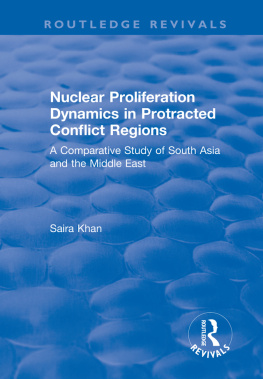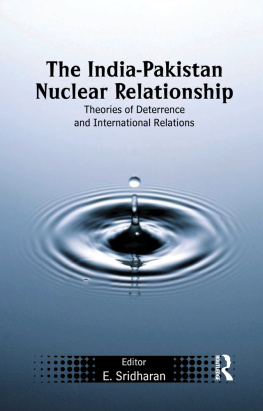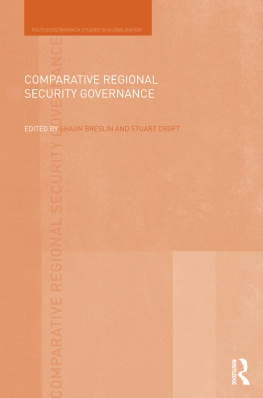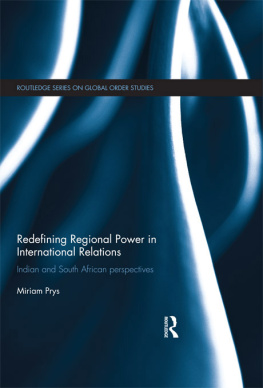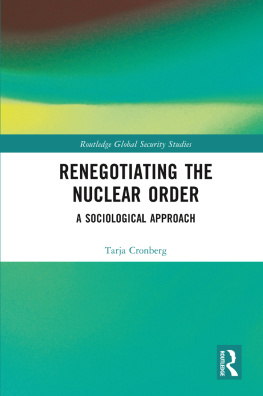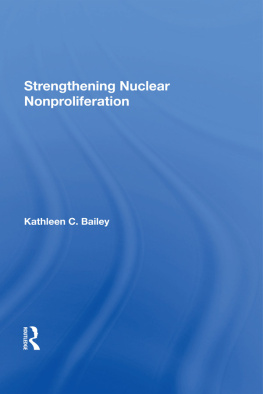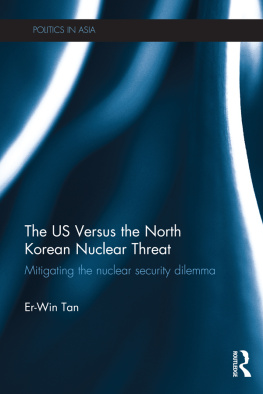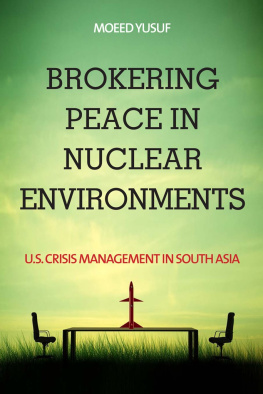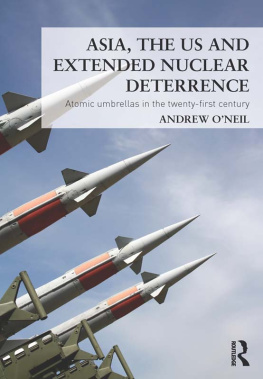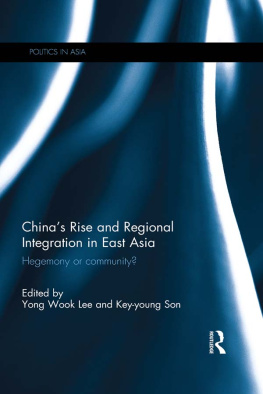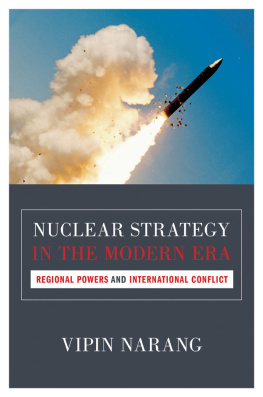REGIONAL PATHWAYS TO NUCLEAR NONPROLIFERATION
SERIES EDITORS
Sara Z. Kutchesfahani
Senior Policy Analyst, Center for Arms Control and Nonproliferation
Senior Program Coordinator, Fissile Materials Working Group
Amanda Murdie
Dean Rusk Scholar of International Relations and Professor of International Affairs, University of Georgia
SERIES ADVISORY BOARD
Kristin M. Bakke
Associate Professor of Political Science and International Relations, University College London
Fawaz Gerges
Professor of International Relations, London School of Economics and Political Science
Rafael M Grossi
Ambassador of Argentina to Austria and International Organisations in Vienna
Bonnie D. Jenkins
University of Pennsylvania Perry World Center and The Brookings Institute Fellow
Jeffrey Knopf
Professor and Program Chair, Nonproliferation and Terrorism Studies, Middlebury Institute of International Studies at Monterey
Deepa Prakash
Assistant Professor of Political Science, DePauw University
Kenneth Paul Tan
Vice Dean of Academic Affairs and Associate Professor of Public Policy, The National University of Singapores (NUS) Lee Kuan Yew School of Public Policy
Brian Winter
Editor-in-chief, Americas Quarterly
Regional Pathways to Nuclear Nonproliferation
Wilfred Wan
2018 by the University of Georgia Press
Athens, Georgia 30602
www.ugapress.org
All rights reserved
Set in Minion Pro by Graphic Composition, Inc., Bogart, Georgia
Most University of Georgia Press titles are available from popular e-book vendors.
Printed digitally
Library of Congress Cataloging-in-Publication Data
Names: Wan, Wilfred, author.
Title: Regional pathways to nuclear nonproliferation / Wilfred Wan.
Description: Athens, Georgia : The University of Georgia Press, [2018] | Series: Studies in security and international affairs | Includes bibliographical references and index.
Identifiers: LCCN 2018003944 | ISBN 9780820353302 (hardcover : alk. paper) | ISBN 9780820353296 (ebook)
Subjects: LCSH: Nuclear nonproliferation. | Nuclear arms control. | Regionalism (International organization)
Classification: LCC jz5675.w37 2018 | ddc 327.1/747dc23
LC record available at https://lccn.loc.gov/2018003944
CONTENTS
ACKNOWLEDGMENTS
This book stands at the intersection of many of my recent lives.
The idea of writing this book came from my friend Hannah Cooper, who, upon hearing about my hazy fellowship plans, asked pointedly: Why not a book? She does not recall this conversation. Hannah, John de Boer, Alexandra Ivanovic, Lee Schrader, Basilio Valdehuesa, and Anthony Yazaki were colleagues who provided much valued encouragement during my time at the United Nations University Centre for Policy Research (UNU-CPR), when the bulk of the work for this project was undertaken. Any expression of thanks is woefully insufficient for Louise Bosetti, the best friend I could ever ask for. Some Pop Rocks will have to suffice.
The genesis for the ideas outlined in this book dates back many years. They are intimately linked to my work on the nuclear nonproliferation regime conducted as a graduate student at the University of California, Irvine under Etel Solingen, Patrick Morgan, and Erwin Chemerinsky, and as a Stanton Nuclear Security Fellow with the Belfer Center for Science and International Affairs under Matthew Bunn, Martin Malin, and Steven Miller. I remain thankful for their guidance; Etels influence especially is evident across these pages and far beyond.
The book was finalized during my time as a researcher with the United Nations Institute for Disarmament Research (UNIDIR). John Borrie and Tim Caughley, among others, have been fantastic to work with and have been incredibly supportive of all my research projects undertaken in my personal capacityincluding this one. I am thrilled to be a part of UNIDIR and the important work it does. I do want to stress that the views expressed in this publication are my sole responsibility and do not reflect the views or opinions of the United Nations, UNIDIR, its staff members or sponsors, or those of any other institute listed in these pages.
Too many othersanimals includedhave provided one form of support or another over the course of this project, only some of whom were aware that it even existed. For instance, both Nobu Akiyama and Sebastian von Einsiedel graciously granted me a great deal of autonomy during my fellowship years. The list also contains friends and scholars like Sungyeol Choi, Anne-Sophie Darier, Elena Finckh, Courtney Fung, Koji Enomoto, Amy Grubb, Kei Koga, Tom Le, and Valerie Wright. I look forward to spending time with each far away from conference halls in the near future and apologize for not providing them their own sentences here. My mom Fina and sister Cordia (a neurologist and the proper Dr. Wan) deserve much more.
Of course, I am indebted to the University of Georgia Press and the hard work of Lisa Bayer, Walter Biggins, Jane M. Curran, Katherine La Mantia, and Thomas Roche in particular. A special thanks to Jeffrey W. Knopf, whose 2015 edited volume initially drew me to the press, and who later provided words of encouragement on my project. The reviewers involved in the publication processincluding the Studies in Security and International Affairs series editors as well as other anonymous individualshelped move this book to a much better place. I am also grateful for institutional support from the UNU-CPR, Hitotsubashi University, the Japan Society for the Promotion of Science, the Social Sciences Research Council, and the Pacific Forum Center for Strategic and International Studies.
Finally, this book would not exist without the help of the bevy of academics, experts, and current and former officials who agreed to talk to me formally and informally about issues spanning the nuclear landscape. The countless individuals who are not directly quoted in these pages still provided indispensable material that informs this work. Any misanalyses can be laid squarely at my feet.
ABBREVIATIONS
ABACC | Brazilian-Argentine Agency for Accounting and Control of Nuclear Materials |
ACRS | Arms Control and Regional Security |
ADMM | ASEAN Defence Ministers Meeting |
ADMM-Plus | ASEAN Defence Ministers Meeting-Plus |
AFCONE | African Commission on Nuclear Energy |
APEC | Asia-Pacific Economic Cooperation |
APT | ASEAN Plus Three |
ARF | ASEAN Regional Forum |
ASEAN | Association of Southeast Asian Nations |
ASEANTOM | ASEAN Network of Regulatory Bodies on Atomic Energy |
BRICS | Brazil, Russia, India, China, and South Africa |
CARICOM | Caribbean Community |
ECOWAS | Economic Community of West African States |
|


